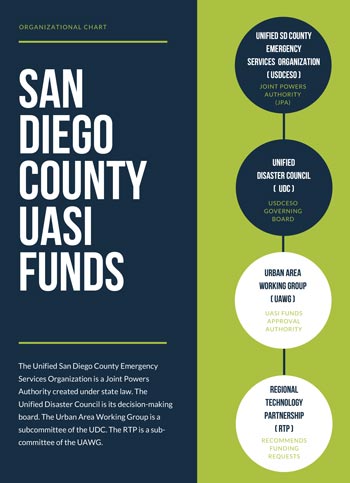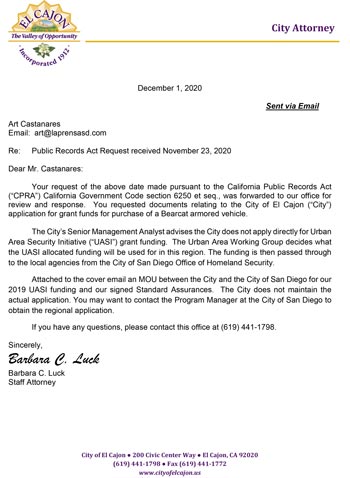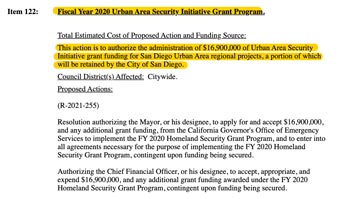Local Law Enforcement Agencies Have Spent Over $200 Million on Tactical Equipment In Violation of Public Disclosure Laws

INVESTIGATIVE REPORT
Editor-at-Large

San Diego County law enforcement and fire agencies have secretly run a local committee that has spent over $200 million on armored vehicles, facial recognition technology, license plate readers, drones, riot gear, and other security equipment and technologies without public participation and in violation of state “sunshine” laws, keeping the public in the dark about purchases of controversial police equipment.
The San Diego Urban Area Working Group (UAWG, pronounced “yu-ag”) is the designated Approval Authority under a federal Department of Homeland Security (DHS) grant program established after the September 11th terrorist attacks.
UAWG, a subcommittee of the San Diego County Unified Disaster Council (UDC), is comprised of a police or fire department representative from each of the 18 cities in the county and the Director of the County Office of Emergency Services (OES) and has been conducting its meetings quietly without giving required public notices.
The San Diego Office of Homeland Security (SDOHS), an office within the San Diego Police Department, manages the UAWG committee and administers millions of dollars per year in federal grants sent to our region from the DHS under its Urban Area Security Initiative (UASI, pronounced “yu-aw-see”) program.
This year’s UASI grant funding allocation to San Diego was $16.9 million, exactly the same amount received last year as well.
Since 2008, the UAWG committee has received and approved funding requests from nearly every police and fire agency in the county, the Sheriff’s Department, the San Diego County District Attorney’s office, and the Automated Regional Justice Information System (ARJIS), a powerful yet mostly publicly unknown organization that manages shared law enforcement information and technology.
A smaller subcommittee comprised mainly of local police agency leaders, called the Regional Technology Partnership (RTP), reviews and recommends projects for funding, and the final decision to fund individual requests is then made by the UAWG.
DHS has designated a total of 47 urban areas in 29 states to “receive funding support for target hardening activities that are at high risk of terrorist attacks, and to promote coordination and collaboration in emergency preparedness activities among public and private community representatives, State and local government agencies, and Citizen Corps Councils,” according to the DHS program guidelines.
.
VIOLATIONS OF OPEN MEETING LAWS
Requests for documents under the California Public Records Act revealed that the San Diego UAWG and RTP committees have not publicized meetings or agendas, reported out their actions, or allowed members of the public to attend meetings. There are no records or files available on the Internet relating to UAWG or RTP meetings, actions, projects, or use of funds for any UAWG meeting since its creation in 2008.
By contrast, the San Francisco Bay Area UASI working group is also an “Approval Authority” for federal DHS purposes and maintains a public website with its bylaws, agendas, meeting minutes, reports, and, most importantly, all of the purchases approved by its committee, as does the Sacramento Regional Office of Homeland Security that administers UASI funds in Sacramento and Placer Counties.
California’s Ralph M. Brown Act, passed in 1953, is one of the state’s “sunshine” laws. It requires government entities to conduct their business at open and public meetings, with very limited exceptions. The Brown Act’s main objective is that the people must be informed so they can keep control over their government.
The Brown Act requires public notices of meetings at least 72 hours beforehand, with action items listed on its agenda to give the public and stakeholders opportunities to comment, support, and/or object to items under consideration. Meetings held in violation of the Brown Act may be illegal and therefore null and void, and any actions taken at those meetings could be rescinded.
The County Board of Supervisors and all city councils, school boards, fire and water districts, and other special districts in the state must follow the requirements of the Brown Act.

When the UAWG was created in 2008, the group deemed itself exempt from the California Public Records Act (CPRA), the state law which declares that “access to information concerning the conduct of the people’s business is a fundamental and necessary right of every person in this state.”
Seemingly against the CPRA, the UAWG Charter’s states: “Documentation provided for or prepared as a result of the UAWG meetings is intended for the official use only of the UAWG membership and selected stakeholders and is not intended for distribution to individuals in the general public or for purposes residing outside UAWG mission areas. It is deemed to be exempt from public records act disclosure under California Government Code 6254(aa) and (ab).”
But as part of the California Public Records Act rather than the Brown Act, sub-sections (aa) and (ab) only exempt public disclosure of a “document prepared by or for a state or local agency that assesses its vulnerability to terrorist attack or other criminal acts intended to disrupt the public agency’s operations and that is for distribution or consideration in a closed session” and “Critical infrastructure information, as defined in Section 131(3) of Title 6 of the United States Code, that is voluntarily submitted to the Office of Emergency Services for use by that office, including the identity of the person who or entity that voluntarily submitted the information.” This section does not in any way excuse an entity from the public meeting requirements of the Brown Act.
Although Section 6254 does provide dozens of exceptions to public disclosure of documents under limited circumstances, including personnel, investigative, and confidential issues which may be handled in closed sessions without public participation, those topics must still be noticed on public agendas before the meeting and a description of any action taken in closed session must be reported after the fact.
None of the requests for and approval of UASI funding for projects would be protected by these exceptions.
Several legal cases have established that local agency committees like the UAWG are considered a “local agency” and covered by the requirements of the Brown Act.
.
HIDDEN IN PLAIN SIGHT
La Prensa San Diego first became aware of the existence of the UASI funds being distributed to local agencies in April of this year when the El Cajon City Council approved a Memorandum of Understanding (MOU) with the City of San Diego’s Office of Homeland Security to qualify for UASI funding. Based on that information, La Prensa San Diego submitted numerous public records requests and inquiries to multiple local agencies to follow the funding process from request to funding.

The El Cajon City Council agenda only stated that the action was to “accept and appropriate the FY2019 Urban Area Security Initiative (UASI) Grant funding in the amount of $419,830, and execute any grant documents and agreements necessary for the receipt and use of these funds.” The item was approved on the Council’s consent calendar, meaning that no public discussion occurred to explain the expenditure.
Only an attached document from the OHS revealed that the funds were allocated for the purchase of a “Lenco Bearcat Tactical Response Vehicle,” an armored personnel carrier used by various law enforcement agencies in the U.S. and other countries. The Council had to enter into the agreement in order to qualify to receive the funds.

According to the El Cajon City Attorney’s office in response to questions from La Prensa San Diego, a regional group of SWAT officers recommended a grant from the UAWG for a Bearcat for El Cajon’s Police Department. The city received a grant for $419,830 for the purchase of a Bearcat and associated training. The El Cajon City Attorney’s office referred La Prensa San Diego to the OHS UASI Program Manager for more documentation, but that person did not respond to our request for documents.
The El Cajon City Attorney’s office also explained that El Cajon and the San Diego Harbor Police Department, who also requested UASI funds for a Bearcat this year, were the only two local police agencies in the County without their own armored vehicles.
If the comments from the El Cajon City Attorney’s office are correct, there are at least 10 existing armored vehicles within San Diego County, not including the El Cajon and Harbor Police Bearcats ordered this year.
El Cajon’s new Bearcat is in addition to another Bearcat purchased in 2014 as a joint-use vehicle between the cities of La Mesa and El Cajon. The cities jointly applied for and received nearly $300,000 from UAWG for a Bearcat under a signed memo where the two cities agreed to share the use of the armored vehicle and split all operational and repair costs for its use.
La Prensa San Diego requested documents from El Cajon detailing expenses paid for maintenance and repairs for the shared Bearcat since 2014, as well as any documentation detailing usage of the vehicle and information on the number of times, if any, that the two cities both needed the vehicle at the same time and created a conflict. The City Attorney’s office said that no such records exist.

The San Diego Unified Port District’s October 6, 2020 agenda listed an item identified as “Resolution authorizing execution of a Memorandum of Understanding between the City of San Diego and the San Diego Unified Port District in order to participate in the Urban Area Security Initiative FY19 grant program, and granting indemnity.” No mention of the use of the funds was detailed.
Again, as in El Cajon’s case, only an attached PDF document from the San Diego Office of Homeland Security describes the funded item as a “Lenco Bearcat Tactical Response Vehicle” for the amount of $397,871 plus $11,500 for “Regional Training Participation.”
A search of the Port of San Diego’s website does not reveal the Bearcat funding because the text search can only read words that appear on the agendas, not on attached PDF documents.
Curiously, other action items listed on the same October 6, 2020 Port District Board agenda included details of the use of funds and dollar amounts, included two projects to purchase vehicle radios totaling $347,000 funded by the same UASI funds which described the items to be purchased and even the name of the vendor company.
Only the item for the Bearcat, like on the agenda in El Cajon, did not disclose that the action was to purchase potentially controversial police equipment. In both cases, the actions were taken on the consent calendar and no public discussion took place to explain or debate the items.
.
OTHER CONTROVERSIAL PURCHASES
The latest UASI grant fund requests included 10 “tethered UAS” or drones used for stationary surveillance, pole cameras, license plate readers, cell phone “cracking” technology used to circumvent passwords, and other technologies that have already caused some cities in San Diego County to suspend and review their use of such equipment.

In September 2018, the City of Chula Vista applied for and received a grant from UASI funds that were listed on the City Council agenda as “accepting $62,815 from the U.S. Department of Homeland Security and appropriating said funds to the police grants section of the federal grants fund for the Urban Area Security Initiative,” without reference to the items to be purchased.
An attached PDF staff report explained on its second page that the funds were used to purchase “55 riot gear equipment” and “infrared beacons and ballistic shields” to be used by the SWAT Team.
In November 2017, however, when the City of Chula Vista received another UASI grant for non-controversial equipment, the agenda item was listed with more detail even though it was for a lower dollar amount, noticing the item as “accepting $38,617 from the U.S. Department of Homeland Security, authorizing the Police Department to purchase radio dispatch console equipment from Motorola Solutions, Inc. based on the County of San Diego’s contract number 553982 pricing and terms, and appropriating said funds to the federal grants funds for the Urban Area Security Initiative.”
The City of Chula Vista has received more than $1 million in UAWG grant funds for various projects since 2008.
The use of surveillance and data collection systems by police without public disclosure has been controversial in cities in San Diego County.
Recently, the City of San Diego Police Department was exposed for using 3,200 street-light surveillance cameras throughout the City without informing the public. La Prensa San Diego first reported the existence of the cameras in a 2017 story, but City officials initially denied the Police Department would use the cameras. After the camera usage was publicized last year, the City Council suspended the camera program until policies and procedures for their use are established.
And just last week, news reporting in the San Diego Union-Tribune revealed that the Chula Vista Police Department had purchased additional police car vehicle license plate readers (LPR) in 2017 without approval of the City Council because the total cost was under the dollar threshold that requires Council action. After the story broke last week, the City temporarily stopped allowing license plate data recorded within the City from being shared with more than 800 other agencies that had access to the nationwide database, including federal immigration agencies, until the City Council can establish use policies.
.
LACK OF TRANSPARENCY ON AGENDAS
The City of San Diego is the grantee and administrator of the UASI funds received from the DHS, and an action by the City Council must accept the money each year.

Recently, the December 8th San Diego City Council agenda listed an item on its consent calendar, “to authorize the administration of $16,900,000 of Urban Area Security Initiative grant funding for San Diego Urban Area regional projects, a portion of which will be retained by the City of San Diego,” without any backup information listing the proposed uses for the funds. This item was the approval of the annual UASI grants from the US DHS.
The Council members and the public were not given any information on potential projects which had already been requested by local agencies, or how much of the funding would be retained by the City to cover staff and operating expenses in managing the program. The item was approved on consent calendar without any discussion.
But just three days later, the RTP subgroup of the UAWG met to recommend the individual funding requests from agencies throughout the County. That group is comprised primarily of police officials from various agencies who score each project and recommend which ones to fund.
Of 70 initial requests totaling over $21 million, 38 were recommended for approval, totaling more than $12.3 million.
A review of San Diego City Council meetings agendas and minutes found that UASI funds have been awarded to the City since 2003. The total amount awarded is $265,645,621 between 2003 and 2020, with every annual allocation having been approved on consent calendar without public discussion.
.
COMMUNITY REACTION
A handful of local elected and appointed officials were willing to discuss the issue of UASI funds off the record but did not want to comment on this story, but several others did not return calls or messages for comment.
Some community leaders reacted to the story with concerns about transparency and accountability.
“Despite law enforcement’s constant opposition to common sense measures that will ensure transparency and accountability in policing, they continue to make the case for community members who have been demanding it. Their policies and practices erode public trust,” Geneviéve Jones-Wright, Executive Director, Community Advocates for Just and Moral Governance (MoGo) told La Prensa San Diego. “As the city of San Diego is poised to go into meet and confer with police leadership regarding two ordinances that will govern the City’s acquisition and use of surveillance technology, I urge our city officials to remember that, according to this newly discovered information, they were misled by SDPD just last week and to strongly push back against the Police Officers Association’s attempts to water the ordinances down for their own selfish purposes.”
Dave Myers, a retired Sheriff Commander, stated that “transparency is vital to maintain community trust in law enforcement. Who the decision makers are, and the allocation of millions and millions of public funds must take place in public. When we don’t know who is behind closed doors deciding which communities receive public funds it perpetuates what we’ve seen for centuries in this country, and that’s discriminatory funding in communities of color.” Myers told La Prensa San Diego. “New technologies law enforcement can access must come with new access rules for law enforcement, must come with community input and improved safeguards. Decisions to allocate public funds for these new technologies must also accompany demonstrated metrics that law enforcement has the infrastructure to safeguard the public’s rights,” Myers added.
[An earlier version of the story reflected an estimated of expenditures totaling an estimated $100 million. The story has been updated to reflect actual numbers uncovered during further research.]


 Arturo Castañares
Arturo Castañares


